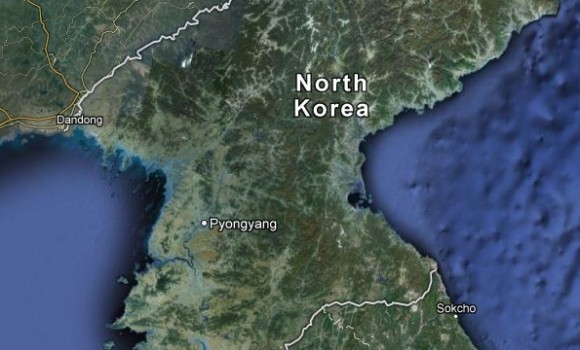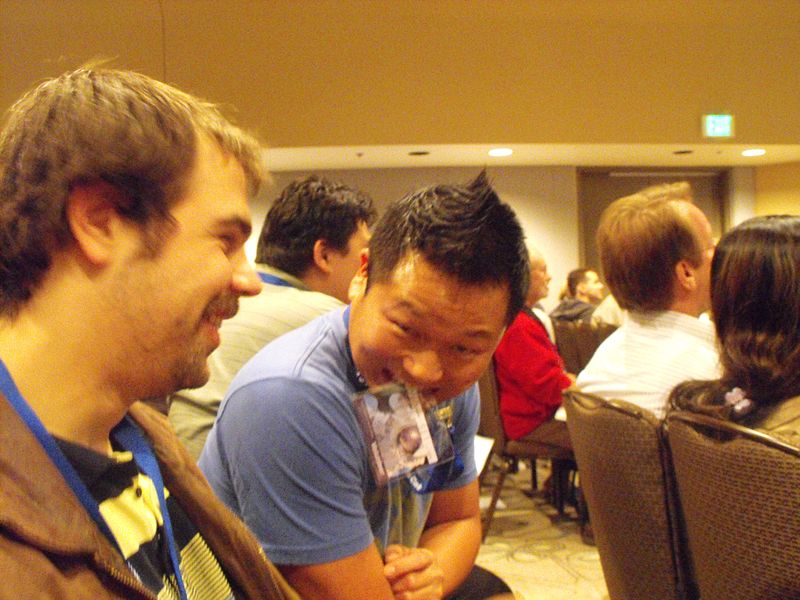A private visit to North Korea
Recent news is all abuzz with the upcoming visit of a former U.S. Ambassador to the U.N., Bill Richardson and Eric Schmidt, the executive chairman of Google, to the hermit country of North Korea. The state department of the United States, still irate with the DPRK’s continued missile testing and rumored nuclear program, has even gone so far as to “officially disapprove” of the visit. But with a government that relies almost exclusively on threats and sanctions to keep the North Korean state in check, could a more businesslike approach finally provide us with some different results?
The resistance to Richardson’s and Schmidt’s visit already caused them to delay once, but continued disapproval seems silly in light of our current relationship with the DPRK. Private sector deals with the country may go quite far in building links between us and them. If our current policies were working so well, we might see some progress, but the only advances in recent years have come in the form of an old leader dying and a new, seemingly more moderate one taking over. Still, just because there’s a new Kim in charge, doesn’t mean they’re going to give up their plans to maintain a strong military. Events in the past have given them more than one reason to think that a weak military will make them into little more than a colony in the global community.
The visiting duo has gone on to explain that their visit is primarily aimed at negotiating the release of a Korean-American detainee, something that Richardson has plenty of experience with. He also expressed concern over the DPRK’s nuclear program and thinks that he may be able to talk more sense than foreign diplomats have been able to so far. He’s had more than 15 years of dealings with North Korea and, at least in my eyes, seems the man for the job. Bringing along Schmidt may even provide the opportunity to use business and economic growth as a form of leverage in the talks.
If constant threats prove useless, perhaps it’s time for us to put our faith in something different? It seems a shame, however, that it must be someone from the private sector who initiates this sort of interaction and even more shameful that our government would actively resist the chance for change based on nothing more than maintaining an aggressive consistency. Hopefully, Richardson and Schmidt can come back from their journey with good news.
Mexico City’s Ollin Kan Festival
Another wonderful music festival in Mexico takes place in the country’s capital, Mexico City. It is called the Ollin Kan Festival and it lasts through the month of November each year, putting on display some of the best performances of music from around the world. Ollin Kan was organized with the intent of trying to preserve musical culture in the face of a steadily expanding globalization of more commercial music and the result is a month of some unique and amazing acts all gathered in one location.
Some of the best musicians in the world come to participate in Ollin Kan. They arrive from as far away as India, China and France, and, of course, there are more than a few from the many countries of South America. Each year sees more than 200 performances across a variety of venues. These venues are placed throughout the city so that those wishing to listen have an easier time of finding something near them. Thousands of people arrive every day of the festival to hear what it has to offer.
The tradition of music at Ollin Kan spans across many genres. Some performances are more modern, such as rock and jazz, while others are very much traditional to the music of a specific region and people. There are many creative and unique styles at the festival, though most of the music falls within the “world music” genre. Many of the acts are accompanied by displays of dancing and other theatrical presentations, all part of traditional cultural entertainment.
Whatever your musical tastes, you’ll most likely find something to appease you during November in Mexico City. And there is, of course, plenty of food and drink to partake of while enjoying the music. Visiting during this time of the year can be a great way to both experience Mexico’s capital and learn more about the endless varieties of music that are present in our world today.
Gun swaps in Mexico
The biggest problem that the country of Mexico is experiencing in recent years is, of course, the presence of massive amounts of violent crime. The cartels are responsible for much of this, including the deaths of tens-of-thousands of innocents, but the country has more common crime from less connected criminals as well. There is already a war being waged to reduce the power of the cartels and return control of the country to the proper government, but now they’re also looking at getting rid of some of the other violence by initiated a gun swap.
Starting at the end of last year, the government began offering to exchange people’s guns for items such as bikes, computers and cash. In that time, they managed to collect more than 1000 guns, including (believe it or not) a grenade launcher and several grenades. The first run was so successful that they’ve extended the program for another week in hopes of getting even more guns off the streets. In addition to collecting guns, they’ve also offered to trade out children’s violent toys for new ones in hopes of steering them away from a future life of crime.
The program started in a district of Mexico City known for having the most violent crimes. Since then, the extension has relocated the collection to yet another problem district. If it continues to be as successful as it has been, it may be that they opt to extend the program further and perhaps even to other regions of country beside the capital.
While the collection of random guns may not stop the cartels, which rely on their guns for business and can certainly afford their own bikes and computers, it does potentially free up more law enforcement. Any reduction in violent crime is a good thing for Mexico right now. With their high body count due to cartel activity, every life saved is truly important to them in showing the world that they are not going to sit back and accept the conditions that have plagued their country for the last decades.
Gift-giving dolphins
Due to their high intelligence, dolphins are one of the most intriguing yet barely understood creatures of the ocean. The ability to study them is made even more complicated by the fact that they live in the water, thus limiting researchers’ chances to observe their many behaviors. It is only when we keep them in captivity (which limits the range of study to less natural behavior) or when they come to us at the shore of our land-locked habitat that we can learn new things about this mysterious species. A new study is focusing on a particular behavior that seems to suggest that dolphins are much more inclusive in who they consider friends than we may have suspected.
Dolphins have been recorded as giving gifts to human beings in the form of the sea life that serves as their food. This is not an isolated occurrence, but one that, while known for some time, has only recently been the subject of intensive research. At one particular Australian resort, 23 of these events have been recorded in recent years and prompted an in-depth examination of the phenomenon.
The main interaction between humans and dolphins at the resort is an environmental program whereby the staff at the resort wades out into the water each evening to feed the local dolphins. Sometimes, the dolphins give back. Staff have received eels, squids and other sea life in return for their kindness. While domesticated animals are seen doing this all the time (if you own a cat, you probably have received more than one “gift”), the occurrence of this in the wild is much lower and sharing between different species is almost unheard of.
There are several different theories as to why this happens. One says that the dolphins are participating in exchange, giving back some of the food they’ve received over the years. Another says that the dolphins view humans as being incompetent hunters and are thus trying to help us out by providing us with a decent meal. The most popular theory states that the dolphins offer food in order to engage in play with humans.
Such activity is one more proof of the presence of culture within dolphin society, culture being one of the defining characteristics of sentience. It is interesting that these dolphins consider human beings as viable family members, not noticing the difference in species but only that there is a reciprocal relationship at work. Perhaps we could learn something from these creatures about looking past the surface and helping others, no matter how different?
Step up against gun violence
I am so tired of people saying we shouldn’t ban assault rifles—not handguns, not hunting guns, but freaking giant assault rifles, for Pete’s sake—because they don’t kill people. So what were they made for, then—planting daisies?
I suppose we shouldn’t ban toxic substances from our food, either, because they don’t kill people; people eating them kill themselves! Babies deserve to get sick from the BPA laced in their sippy cups; damn children need to pay attention to what they’re drinking from, amirite?
Look, I like to shoot. When I was ten, my dad taught me how to shoot a handgun and I’m not bad at it. It’s fun to shoot cans. I like to shoot bows and arrows at targets, too. But I would gladly give up any of these things if it meant protecting people and moving toward a peaceful world—and make no mistake, we cannot have peace with the prevalence of weapons in our lives. I honestly feel safer with a baseball bat in my hand than a gun, anyway.
Why? Because if you have your gun locked away, on safety, unloaded and stored like you’re supposed to (especially if you have children) how the hell is that going to help you when you have an intruder in your home standing over your bed, ready to harm you? My bat by the bed gives me much more confidence. I have had one since I was a teenager and learned what some men do to women, and it gives me a peace of mind that a gun would only take away.
Here’s something else. I have a seven-year-old, and you can tell me to lock up a gun (we don’t have any in the house, by the way; I don’t even own one) and it will be safe. I will tell you that you are stupid. My daughter is a clever little trickster who can find ways into locks even with my husband and me at our most responsible behavior. Kids do this; it’s how they learn and explore. If you tell them not to go into the cabinet, they’re going to find a way into Narnia with or without your help—and to your gun.
How many have to die before you’re willing to move toward peace, America? States that have passed strict gun regulations have fewer incidences of death from guns, and countries who have passed such legislation show improvements as well. Look, even if you won’t pass a ban, there is absolutely nothing wrong with requiring more red tape to jump through! You have waiting periods, insurance, licenses and other requirements for things like fishing, buying a car, and getting married. Throw all of those in with a gun safety class and I’d be much happier. That mandatory waiting period might just give a possible shooter the day or two he needs to reconsider—and with so much work to do, some unhinged person isn’t going to waltz in, grab a gun, and start shooting right away.
Of course, I also like Chris Rock’s ideas on the issue (language warning).
Click here to voice your opposition to loose gun laws.
Maybe your safety is too safe
Recently I wrote a piece about safe water games for kids to play and someone commented that my ideas—such as diving for toys or swimming to boundaries made with ropes and floating bottles—were not safe. I am thinking that this commenter is either:
A) A helicopter parent
B) A parent who doesn’t want to monitor his or her own kids
C) Someone without kids entirely
These are all perfectly fine games to play at the beach. We play them at my parent’s beach at their lake, which has a nice, level beach with well-defined boundary lines before you get to the deeper end for boats and adult swimming. I think when people think of “safe,” they must either think of their kids not being able to do anything at all, or perhaps not needing to supervise their children as they play. Just as with cars, safety is in the hands of the driver—or, in this case, the parent. If you’re going to booze it up and ignore your child, don’t take him to the water in the first place!
George Carlin often made jokes about the safety levels in America, and while I don’t agree that we need kids to die due to “natural selection” when it can be avoided, I do think he was right on the matter that we just have too many safety laws in this country and NOT enough common sense. In fact, if we had more of the latter taught in public schools, we wouldn’t need the former so much.
It’s natural to worry, and it’s also important; I know people who have lost children to sickness, to car accidents, and I know they run over what they could have done differently in their minds every single day, consumed by the guilt and grief. We cannot agonize over “what ifs,” but those senses of worry that we have are responsible for keeping mankind alive since mammals began. If a sleeping mom doesn’t worry enough to keep one ear open at night to protect her baby from a hungry lion, after all, where would we all be?
But like everything, you can take it too far—and then one day you wake up and your high school graduate doesn’t only not know how to drive, but also how to swim, skate, or even use the signs to walk around the block because he’s been so sheltered his entire life. And that, friends and neighbors, is the most unsafe thing of all—sending an unprepared child out into the world.
For 2013, how about being yourself?
Once upon a time, I was a teenager who envied the popular girls. I had been one myself not many years before, back when most kids in a classroom could be called friends. Somewhere along the line, however, being friendly and funny stopped being very important, and the brands and makeup you wear started.
I saw the kids wearing their jackets and shirts with strange labels on them—some that I’d never even heard of before, all with made-up sexual codes that only teens can think up—and their sticky-looking gummy shoes and their perfect, pretty backpacks, and I wanted them, too. I didn’t really want them for myself, but I thought that if I had them people on the cheerleading squad or the football team who used to be my friends might consider being friends again.
When I finally bought my first silly, gummy plastic bag for carrying my books, I was dismayed at its space. How did everyone fit their textbooks in these things? They were like oversized jelly shoes! It didn’t take long for my straps to break, which was fine, because I looked ridiculous carrying the bag. Even though I had spent all of my babysitting money on it, maybe it wasn’t worth the raised eyebrow from a science teacher who otherwise doted on me, and it sure didn’t get me any friends.
It didn’t make me happier, that’s for sure.
What did make me happy is what makes me happy today—something I can gratefully say that I do much more often, on a very regular basis. (Of course, my child now claims I embarrass her when I talk to random strangers or proclaim myself to be Mrs. Pine Tree when introducing myself…) I get to be me.
On rare occasions in school—usually during after-school functions, though also sometimes at lunch—I could be my goofy, quirky, plain old regular girl self with a select number of friends I could count on little more than one hand. I could giggle and snort and be as normal as I could be without having to try to be like other people, and I know several kids who did that very same thing every day without even caring what anyone thought.
Today, I envy them. I wish I had known then what I know now; it would have saved me a lot of pain and heartache. Imagine if kids who are bullied like I was, or who lose friends like I did, knew what’s in store for them later in life. I think they’d be at least marginally happier, and maybe even look forward to the future rather than dread each day ahead.
We could make 2013 the most radical year yet by just being ourselves, without change, without resolutions, and encouraging our kids to do the same.
Why we need girls in movies
I think it should be clear enough, but sometimes I hear a few naysayers whine, “We don’t need more girls in movies! Just because Buzz Lightyear is a boy doesn’t mean girls can’t relate to him or want to be like him.” This drives me absolutely nuts.
I had a dream last night that made me think of this. In my dream, I was a man in a TV show—I can’t remember which, but I think I was a cop—and I had a wife and kids and everything. I wasn’t living as a cop as myself; I was the man. It was as if my mind couldn’t see me being the celebrated cop because he wasn’t female; I couldn’t relate.
That’s your subconscious, you might argue; that doesn’t count. I would argue that counts even more than the conscious, but let’s say, for the sake of argument, that you are right. Let’s evaluate the dozens of conscious examples where my daughter, where the daughters of friends, have repeatedly expressed—or been told by other girls at some point or another—that their Cars shoes are for boys, that their haircut is for boys, that girls can’t be doctors or astronauts or cowboys or bloody anything other than moms, teachers, and nurses.
My daughter has short hair, loves animals, hates dolls, and often gets confused as a boy. She doesn’t care, usually, though sometimes she huffs. I’ll make a point to stress that SHE will have chocolate ice cream, thanks; SHE likes the blue car. Incredibly, many people just continue with their assumptions, having not heard—or not listened.
If there’s really no difference, why does this disconnect exist? Why do girls still think that they can’t do certain things even after we stress it every single day? I want a little girl in a big floating house, a little girl astronaut, and a little girl monster fighting to save the world from Pixar. Merida was lovely—but we need much, much more.
Oh, and that clear reason I mentioned above? It’s the freakin’ fact that girls make up half of the population. Any film that denies that is just stupid. Why is it so hard to make half of your characters girls? And to make your girl characters into things other than fashion and boys? Take a page from Miyazaki’s book and give us some strong girl characters, Hollywood.
Take action on causes you support
Ready to start off the New Year with a few activist actions? Add your voice to the following campaigns to help make 2013 a fantastic year of change and growth for our country—and the world itself.
End mountaintop removal: President Obama has expressed his aversion to mountaintop removal in the past, and the government has been researching the harm that this destruction causes while he has been in office. That said, the violent practice still persists, and we need to add our voices to its opposition to get it to stop in 2013. Click here to read more about this issue and to ask the president to stop mountaintop removal once and for all.
Protect mustangs from slaughter: Wild mustangs sort of amaze me. The fact that we have any wild horses left at all just warms my heart; there are so few wild anything left with us noisy, big humans taking over everywhere. I really root for these horses. Some people, however, like the governor of Nevada, would rather see these horses shipped to slaughter at an auction rather than revel in the beauty of the few we have left. Thankfully activists have chipped in to save the latest wild mustangs he wanted to have murdered, but his philosophy on the issue remains a disturbing one. Click here to tell him to stop selling horses to profit in such a brutal way.
Ask Obama to talk about climate change: He’s dodged this question quite enough, don’t you think? As we continue to run out of fossil fuels toward the brink of our own demise, we are in desperate need of alternative sources of good, clean energy, and it’s got to be done now—well, really twenty years ago would have been nice, but we’ll take what we can get. Click here to tell President Obama that it’s time to break this silence on climate change and to finally get a plan in action to break our oil addiction, once and for all, before it’s too late.
Help Hurricane Sandy victims: Did you know that the House still hasn’t approved disaster relief funds for victims of Hurricane Sandy? This is absolutely shameful. I think that two months of salaries from House members should be the minimum relief sent at this point. What is the point of government at all if the people aren’t being helped? Tell John Boehner to stop blocking this relief and help our citizens already!
Let your kids be kids!
A few days ago, we took our daughter to the St. Louis Magic House for the day, something that we mean to do more often since we live pretty close to the fabulous children’s museum. It’s more like a giant play place, with a huge life-size beanstalk to climb, big slides, sandboxes, an enormous fun town replica of a village to explore, and even an Oval Office. It’s pretty fabulous, and even though we got sick the same day—possibly from the germs of many children running amuck—I would have done it again for the joy it brought to my daughter’s face.
While she was playing in the Water Works area, getting wet and having a blast like you’re supposed to at the Magic House, a mom with two younger sons fussed around them as they joyfully explored the water. “Conner! No! Stop! No splashing!” she would fume, and the poor kid—he was four or five, maybe—would stop, baffled. After all, he was in the water room; wasn’t he supposed to play in the water? He would, of course, start splashing again, and finally she just picked them both up and stormed off, saying it was time to go home.
My husband and I had been sitting there smiling, talking together and occasionally taking photos as our seven-year-old played independently. Did we act like that once? I’d like to say no, but I’m sure we did sometime or another. It broke my heart to see these two poor boys’ faces just crumble—they didn’t even cry, they were simply devastated—while their poor mom just didn’t know what to do to control them. Had she let go of control, maybe they could have all had some fun.
I really believe we’re all doing the best we can with what we know. I have seen much more violent displays of parenting, and I am sure that mom was really just trying to make her kids either not get wet or not be a nuisance—something we are constantly pressured to do by a society that often, incredibly, despises kids. I wanted to go to her and say, “It’s okay. They’re kids; they can play! Next time bring a change of clothes and it’s all good.” Then she could have sat next to us and watched them all, sharing in their joy instead of creating more stress for herself and her boys.












